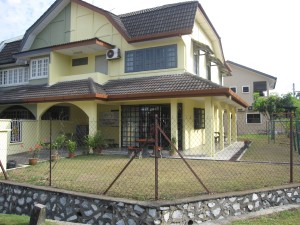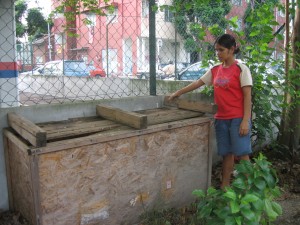New Subang Centre – 15 April 2009

The Association has been on the look out for a bigger premise at Subang Jaya for some time as there is a long waiting list of students wanting to enroll at the Subang Centre. Due to space constraints we could not take in more than 20 students.
In mid-April, the new Centre at USJ 4 was opened. This corner house (also known as the Yellow house)– as per the photo attached, is more spacious and can accommodate another 2 classes.
New Address: 2, Jln USJ 4/4B Subang UEP. Tel: 8023 0919
Dyslexia Association – membership
Join the Dyslexia Association and receive the latest information on the current situation regarding dyslexia via our newsletters. You can also attend the seminars and workshops organised by the Association to keep you abreast on the National Dyslexia programme, remediation, therapies etc… available to help the children with dyselxia.
Membership forms can be collected from any of the 3 Dyslexia Association centres:
Ampang (Head Office) – JKR 3488, Jalan Ampang Hilir 4, 55000 Ampang, Kuala Lumpur. Tel: 4251 5618
Titiwangsa centre – No 6, Persiaran Kuantan, Setapak 53200 Kuala Lumpur. Tel: 4025 5109
Subang centre – 2, Jalan USJ 4/4B, 47610 UEP Subang. Tel:8023 0919.
Membership fees: RM50 per annum
Registration fee: RM30 once off
Introduction of Effalex in liquid form by Biolife -24 Oct 2007
Biolife organized a small get-together for the media people (about 30 people) – from Parenting and health magazines held at EcoGreen Café from 3 -5pm on Wednesday 24 October 2007.Due to requests from parents for the liquid form (as the smaller children are not able to swallow the existing Effalex capsules), Biolife finally brought in this liquid form.
Biolife’s representative gave a brief talk about Effalex at 3.30pm.
After the talk, there were a couple of questions asked about Effalex – the price of the liquid form as compared to the capsules.
The sharing session started with me telling of my son’s experience on Effalex. I attended the Effalex Launch by Dr Jacqueline Stordy in 2002 at Armada Hotel. I even bought her book titled “The remarkable nutritional treatment for ADHD, Dyslexia and Dyspraxia”.
Having read her book and receiving testimonials from 2 friends whose children improved with Effalex, I decided to buy Effalex for my son. Of course, I asked my family GP about this Effalex and he told me that fish oils had no bad reviews and have been in the market for many years. Therefore, it is safe to take the recommended dosage of 4 capsules in the morning and 4 in the evenings for the first 3 months as per the instructions on the bottle.
After 2 months I noticed that my son did not rubbed his eyes anymore when he starts to do his schoolwork. He did not strain his eyes or feel tired as before. If he starts to rub his eyes often, it would have been that we forgot to take the Effalex for a few days.
Mdm Patricia Thava, who owned a kindergarten before but recently sold it off, continued with the sharing session by telling the audience that she noticed improvements in her students who took Effalex. She noted that by shaking hands with the kids, she instinctively knows who needs Effalex.
She recommends Effalex to many of her stuents.
After the sharing session, Mr Yap demonstrated the Jumping Jacks clay. This playdough is non-sticky, non toxic and is sweet smelling. We were all given some clay samples to play with.
Ms Yam, the Director of Biolife explained that they felt that playdough is very important in improving the children’s sensory skills hence they have teamed up with this ‘Jumping Jacks’ whereby their Effalex products come with the free playdough.
Ms Yam thanked Mdm Thava and myself for sharing our experience with everyone here and presented us with their sample Biolife products.
The session ended with a small hi-tea session of organic mee-hoon, curry -puffs and puddings.
Ms Hooi Bee, from Biolife said that they are offering up to 40% discount of their Effalex products if one purchases 6 bottles. One need not purchase all 6 at one go. For further information, you can call Ms Hooi Bee at 012-6368384.
Report by Cho Suet Sen
Note: Ms Hooi Bee emailed me on 30 June 2008 to say that last year’s offer as above has ended. Present offer valid till 18 July 2008 is RM 60 per bottle for Effalex liquid (150ml) and RM140 for capsules (300 caps).
For inqueries after 18 July, kindly contact Biolife’s office directly as Ms Hooi Bee will be leaving Biolife.
Asian Brain Based Learning Conference 19 – 20 May 2006
(Conference on Learning Difficulties) by Cho Suet SenTwo of our Committee members, Coralie Leong and Dr Khoo Teik Beng were invited speakers for this Conference. Coralie spoke on Dyslexia – the Hidden Disability:identification and Educational Issues. Dr Khoo spoke on “Screening for disabilities among pre-school children.
This conference was attended by more than 200 participants including yours truly- who was given a complimentary pass (Courtesy of Coralie). Otherwise the conference would have cost me RM240.
This Conference was organized by Wizkids Resources Sdn Bhd and Scientific Learning Corporation, USA. Whizkids has its KidzGrow Centre for children with Learning Disabilities whereas Scientific Learning launched their Fast forWord Product in 1997 to help learning Disabled children.
The conference started off with the Organisers expounding their product. The keynote address was given by Dr Steven Miller from Scientific Learning entitled: Re-mapping the Brain: The Stanford University Study on children with Dyslexia.
This was followed by other Speakers who spoke on the following topics on the 1st day:-:
Sensory -Motor Develeopment & Learning in Children- Cheryl Chia
Attention Deficit/Hyperactivity Disorder (ADHD)- Dr. Gaia Scerif
Atypical functioning of the ‘Social brian” in individuals with Autism Spectrum Disorders- Dr Atsushi Senju
Genes, brains and development: New frontiers in the study of developmental disorders- Dr Mayada Eisabbagh
The 2nd day continued with Dr Miller’s keynote address entitled: Using neuroscience and Advanced Technologies to Accelerate Academic Success.
This was followed by other speakers on the following topics:-
Children learn by Doing – Ruth Liew
Intelligence is not enough for learning – Dr Atsushi Senju
The importance of learning skills – Cheryl Chia
Brain Based feeding – Usha Viswanathan
Living with ADHD – Dr Nicole Pitchford
The 2 day’s conference was an eye opener and information gathering as the latest brain development and research worldwide was presented by the respective experts. Some topics were too ‘technical’ for a layperson like me to understand. Luckily we have Dr Khoo around to explain all these technicalities.
On the whole, I found this conference very interesting and being a parent with a son who is dyslexic, I am always on the look-out for new technologies/therapies that can help my son. Nothing ventured, nothing gained is my motto. So I will be investigating this product to see whether it can help my son.
Workshop at SEGi College – 1 Sept 2007
Journey into the World of Dyslexia Children – 1 September 2007 ( 9am -1pm)
Workhop organised by SEGi College Subang Jaya
A half day workshop was held whereby there were 29 participants. Two thirds of the participants are students enrolled in SEGi’s Early Childhood courses. SEGi runs 6 Montessori schools throughout the nation. The students will do their practicum in these schools.
Response was not very good due to the fact that it was the Merdeka Weekend. Nevertheless, there were 2 parents who came all the way from Ipoh just for the talk. There were also 3 Kebangsaan teachers who came from Seremban.
The Head of the Education Department, Mdm Rosaline Ng gave the Opening Speech.
My first talk was on “What is Dyslexia?” Many questions were asked during my talk.
Only 15 minutes tea break instead of the planned 30 minutes was given due to time constraint.
After the tea break, I continued with my second talk which was about “My child and Me”. Numerous questions were also raised in the midst of this talk.
After my 2nd talk, the participants were divided into 4 groups to discuss ways to spread awareness and how to reach out to help more dyslexics.
Due to time constraint, only 2 groups presented their views. The other 2 groups had more or less the same points hence it was not necessary for them to present. Points raised were on identifying dyslexics, who can identify them? What is the government doing about this? Any help given to reduce the burden of the parents? Exam marking should be more lenient, etc….etc…
I was then requested to wrap up the workshop and also to answer the 7 questions written on the board during the tea-break by the participants.
The participants were given our Dyslexia postcards and leaflets and a couple of students were keen to work with the dyslexics.
SEGi College presented me with a bouquet of roses for giving the talk. They presented a big Art work done by the children of the participants to the Dyslexia Association. These children were in another hall doing this creation whilst the Dyslexia workshop was being conducted. This Artwork will be delivered to our Ampang Head Office.
Report by Cho Suet Sen. H/P 012-2673332
Tea and Talk at Persatuan Tadika Malaysia
Saturday 11 August 2007 (9am – 12pm)
This talk is to discuss the implementation of the National Preschool Curriculum (NPC)
There were 30 Pre-school Operators and teachers who attended this talk.
The Chairman, Ms Jaya Perera welcomed everyone to the talk and hoped that participants would contribute their views on improving the NPC which would benefit the preschoolers.
Ms Jaya introduced the Persatuan’s Advisor Dr Ling Chew Poh who was allowed to give a 2 minute opening speech. Ms Jaya then introduced the Facilitator, Dr Ng Soo Boon (Head of Preschool Unit, Curriculum Development Centre, Putrajaya).
Dr Ng is here to collect data on the NPC. Dr Ng explained the policies at the Ministry and also the Education for All (EFA) signed with UNESCO and UNICEF. The Ministry is looking into the current policy. As per their survey, statistics shows only 57% of preschoolers, age 4-6 years old attend school in Malaysia, whereby Indonesia showed a higher percentage. This does not bode well for our country. Most probably there are many Tadikas that are not registered, hence not covered under the survey.
As per my question of Dyslexia being implemented into the curriculum, Dr Ng mentioned that this area is lacking but stated that this is being looked into by a different department.
Various points were raised and discussed by the Pre-school operators with Dr Ng .
Dr Ling was called upon to sum up before tea break. Dr Ling brought us back to the 1970s on the history of how this NPC book came about. During those days, the key word was Play for pre-school or just Activities. Then it was changed to ‘communication- based’. Then the integrated approach. Now it has come back to Activities.
Dr Ling felt that the child today has lost the sense of play. He suggested that a Project Approach be taken whereby webbing/theme approach be taken. All these should be associated with Activities .
Dr Ling also mentioned that children who are ahead be allowed to go ahead(gifted) instead of just following the Average/Standard Approach. Same goes for those who are slower.
This is where I interjected that this is not allowed in the current system as children are gauged and assessed according to their biological age. Dr Ng explained that there are many programmes started for the GIFTED, also for SLOW learners etc…. It is just the implementation stage that needs to be boosted up.
After tea break, the operators were asked to fill in the questionnaire prepared by Dr Ng for improving the NPC.
Report by Cho Suet Sen
Dyslexia Association Centres
Head Office: JKR 3488, Jalan Ampang hilir 4, 55000 Ampang, Kuala Lumpur. Tel 03-4251 5618
Subang Branch: 2, Jalan USJ 6/2B, 47610, UEP Subang. Tel: 03-5631 3919
Titiwangsa Branch: 6, Persiaran Kuantan, Setapak, Kuala Lumpur. Tel: 03-4025 5109
YB Dato Ng Yen Yen’s visit
Dato Dr. Ng Yen Yen’s visit to the Dyslexia Association on 18 February 2005.
The Dyslexia Association, being a Partner in the MCA’s Life Long Learning(LLL) campaign, welcomed Dato Dr. Ng Yen Yen’s visit to our Centre whereby TV Astro came to assist in spreading awareness on dyslexia.
Dato Dr. Ng Yen Yen (Deputy Minister of Finance and President of MCA Wanita) came along with Dato Liow (MP for Bentong) to visit our Centre. Pn Sariah gave them a tour of our Centre and explained about the teaching aids used in our Centre.


Dato Ng Yen Yen held a briefing for the parents to explain the objectives of the MCA’s LLL campaign, what it is all about and what is been done to create awareness amongst the public.

After her briefing, Dato Dr Ng had a Press Conference to explain the role played by our Association and MCA’s LLL campaign.
As it was still Chinese New Year, Dato Dr. Ng and Dato Liow gave out oranges and ang-pows to all the children at the Centre. The kids were of course very happy to receive their gifts . Together with Dato Dr.Ng and Dato Liow, they sang “Rasa Sayang” and a couple before bidding farewell to the VIPs.
The Astro team stayed back and interviewed our Members ie. June Loh, Lily Yeoh and Yuen Lan. This footage was shown on March 22- Astro Channel 19 News.
Reported by Cho Suet Sen
Activities at the Dyslexia Centres
Activities at the Dyslexia
Association
Small group tuition classes
Dyslexic children usually learn faster when they are taught in a small group or on a one-to-one basis. Each child gets personal attention. Tuition classes (about 3-4 children) are available here. There are daily classes, including Saturday classes.
Educational and psychological tests
Tests to diagnose dyslexia are available.If more tests are needed, we will refer you to a psychologist, speech therapist or medical specialist.
Seminars and workshops
Since 1993, the Association has organized seminars and workshops. Our aim is to educate the community about dyslexia and other specific learning disabilities. Speakers include qualified teachers, psychologists and other professionals who have worked with dyslexic children.
Activities in the Community
The Committee is happy to arrange speakers for seminars at schools. The goal is to give teachers and parents more information about dyslexia, to help them understand the problems of dyslexic children.
dyslexia leaflet
Dyslexia
What is it? Can it be “cured”?
The word DYSLEXIA comes from the Greek language. DYS means ‘difficulty’ while LEXIA
means ‘written words’. So dyslexia is simply a word describing the fact that some people (5-10%) find it hard to learn to read and write, even though their intelligence is ‘normal’. Some dyslexics are actually very ‘bright’.
Examples of famous dyslexics:
Albert Einstein, Richard Branson, Walt Disney,Tom Cruise, Whoppi Goldberg, John Lennon, Lee Kuan Yew, Leonardo da Vinci, and many more..
While it seems to be clearly established that dyslexia results from differences in the structure and function of the brain, it is still not very clear what causes dyslexia.
More recent studies use the fMRI (functional Magnetic Resonance Imaging) to scan the brain and map the neural circuitry while subjects are reading. The imaging studies revealed markedly different brain activation patterns in dyslexic readers compared to those in good readers.
Dyslexia is not a disease, so we do not talk about a ‘cure’. Although it is a lifelong condition, most dyslexics learn to read and write well. Early intervention is advised.
-
Recent
- “Friends” and “foes” in my organic garden
- Session with Dato’ Lat – 1 Nov 2009
- Fruits of my labour
- Pot of herbs and flowers
- bouquet of organic flowers
- line dancing – Bandar Sunway
- herb and flower basket
- Mien Kum – thai appetizer
- Foo Shearn’s drawings
- Bio dynamic farming (Qi farming)- 20 June 2009
- Singing at Brickfields temple- 28June 2009
- New Subang Centre – 15 April 2009
-
Links





